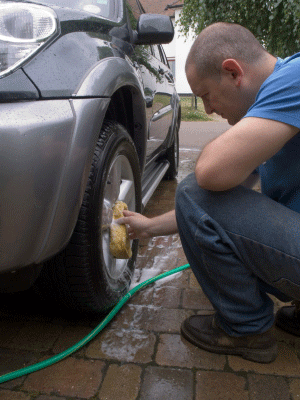 There's a few things you can do to make your car washing a little
less harsh on the environment and water resources. Here's some tips:
There's a few things you can do to make your car washing a little
less harsh on the environment and water resources. Here's some tips:
Wash your car on the grass.
This will give the grass a drink, the soil will help to break down
impurities and prevent the water from entering stormwater drains and
winding up in local waterways. Some of the chemicals in car wash
detergents are nutrients for algae; so this water getting into
waterways can add to algael bloom and eutrophication problems.
Be hose wise
The only time you should have the hose on is when rinsing. Also use
an adjustable trigger nozzle to improve pressure while reducing water
consumptions
Detergent
Use an earth friendly detergent or consider not using any at all if
possible. If you do use detergent, don't use in excess of
manufacturer's recommendations; you'll only waste money, put more
chemicals into your lawn and you won't get a better result.
Use a bucket more
The hose should only be used for the final rinse. Sure, it's easier
to sit there and blast off grime with the hose, but it uses a ton of
water. A bit of elbow grease using a sponge and bucket is good exercise
too :).
Wash in the shade
Hot metal evaporates water incredibly quickly. The more that
evaporates, the more you'll need to use so try and either wash your car
in the shade, wait for a cloudy day or do it early in the morning or
late in the evening.
Wash less
Back in the day, it wasn't unusual for guys to wash and polish their
vehicles every Sunday - it became somewhat of a tradition. If you're
washing your car purely out of habit rather than necessity, take a deep
breath and try and go cold turkey for a while. It can be done and your
car won't fall apart :)
Automatic car wash
Is an automated car wash greener? The answer is - it depends. If
you pass a car wash on your way to and from work, or during any of your
regular driving, it could be a more environmentally friendly
alternative. Modern car washes use far less water than a home wash and
they recycle their water. Automated car washes use anywhere from 20 to
45 gallons of water, but home washing can easily use in excess of a
hundred gallons.
If getting to a car wash requires a special trip, then it's likely
not a green option when you consider the emissions of your vehicle and
gas consumption to and from the car wash.
Waterless car wash
I've noticed a lot of products on the market now claiming to be
waterless car washes that are also environmentally friendly. I can't
say I've ever used them, but I have read some encouraging reviews.
These earth friendly products are made primarily from vegetable
extracts and silicone. The are said to attract dirt via electrostatic
means and then coat it. It's a matter of wiping on and wiping off. I
was always taught that wiping off dirt in such a manner scratches the
paint work, but if these products do really coat dirt, I guess it
wouldn't be such an issue.
Perhaps these waterless car washing products could make a good
alternative for when your car has only light grime or could be used
every other time in order to reduce overall consumption of water.
As always, with any product claiming to be environmentally friendly, read the label and do a spot test first.
A nice shiny car is certainly a pleasure to behold, but given that
fresh water is becoming an increasingly scarce resource and the general
environment is rebelling against all the toxins and excess nutrients
we've pumped into it over the years, it's now time for us all to
practice moderation in all things - including washing our cars.







